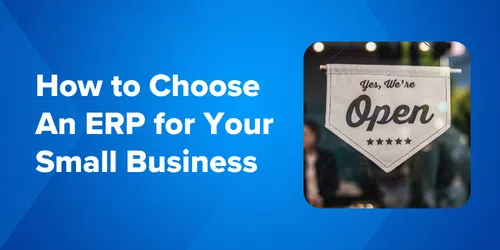How to Choose an ERP for Your Small Business

Choosing the right ERP (Enterprise Resource Planning) system can be transformative for small businesses. The right solution will help you streamline operations, gain visibility into your finances, support growth, and improve decision-making. However, with numerous options available and limited resources, selecting an ERP system can feel overwhelming.
In this guide, we’ll walk you through what to consider when choosing an ERP for your small business, provide a handy checklist, and highlight some of the top ERP systems built for small business needs.
What to Consider When Choosing an ERP for Your Small Business
The ERP you choose will shape the way your business operates for years to come. That’s why it’s critical to take the time to evaluate your needs, consider your growth plans, and avoid some common pitfalls. Below are the top things to keep in mind:
1. Business Requirements
Start with a deep understanding of your business processes. What departments will use the system? What pain points are you trying to solve—manual processes, lack of data visibility, inventory mismanagement, or financial reporting gaps?
2. Ease of Use and User Adoption
Your ERP won’t succeed if your team doesn’t use it. Look for an intuitive interface, role-based dashboards, and solutions with built-in training or support.
3. Scalability
Choose a solution that can grow with you. Whether you plan to expand to new markets or add product lines, your ERP should be able to scale without costly customizations.
4. Industry Fit
Some ERPs are built for specific industries, offering pre-configured modules and templates. If you’re in manufacturing, distribution, nonprofit, or professional services, look for a solution tailored to your space.
5. Deployment Options
Do you want a cloud-based system or an on-premise solution? Cloud ERP systems offer lower upfront costs, automatic updates, and remote accessibility, making them ideal for growing businesses.
6. Integration Capabilities
Can the ERP integrate with your existing systems—CRM, ecommerce, payroll, etc.? A flexible, API-friendly ERP will save time and money over time.
7. Total Cost of Ownership
Understand not just the licensing cost, but the full picture: implementation, training, support, upgrades, and future expansion.
8. Vendor Support and Reputation
Choose a vendor with a proven track record of supporting small businesses and a solid partner ecosystem for implementation and long-term success.
Common Mistakes Small Businesses Make When Choosing an ERP
Choosing an ERP system is a significant decision for any small business, but it’s easy to fall into common pitfalls during the process. Rushing the decision, neglecting proper planning, or focusing solely on current needs can lead to costly mistakes and missed opportunities. To help you avoid these challenges, we’ve outlined the most frequent errors small businesses make when selecting an ERP—and how to steer clear of them for a smoother, more successful implementation.
- Rushing the decision without involving key stakeholders
- Underestimating implementation effort and skipping proper planning
- Choosing a system based on current needs only, without considering future growth
- Failing to test the system or ask for demos and references
- Over-customizing the solution instead of adjusting processes to fit best practices
ERP Evaluation Checklist for Small Businesses
Selecting the right ERP system is a crucial step for small businesses aiming to streamline operations and support growth. This ERP evaluation checklist outlines the key steps and considerations—from identifying your business goals to assessing scalability—to help you find a solution that aligns with your needs and sets your business up for long-term success.
- Identify your business goals and ERP must-haves
- Define a clear budget (implementation + ongoing costs)
- Evaluate deployment models (cloud vs on-premise)
- Request demos and trial environments
- Assess ease of use for non-technical users
- Review available integrations and APIs
- Research vendor reputation and support structure
- Ensure the ERP can scale with your business
Top ERPs for Small Businesses
With a variety of ERP options available, each tailored to specific industries and business needs, it’s important to understand what sets them apart. Below, we explore four leading ERP solutions—Sage Intacct, Sage 100, Microsoft Dynamics 365 Business Central, and Oracle NetSuite—highlighting key features, strengths, and ideal use cases to help you decide which is the best fit.
Sage Intacct
Sage Intacct is a cloud-based financial management solution designed for growing companies that require robust accounting and reporting. It’s known for best-in-class financials, automation features, and deep visibility into performance metrics. Sage Intacct is especially strong in industries like professional services, nonprofit, and SaaS.
Sage 100
Sage 100 is ideal for small to mid-sized manufacturers, distributors, and service-based businesses that need more than basic accounting software. It offers strong inventory, order management, and job costing capabilities. Sage 100 can be deployed on-premise or hosted in the cloud.
Microsoft Dynamics 365 Business Central
Business Central is a flexible, all-in-one ERP from Microsoft that connects finance, operations, sales, and customer service. It’s a great option for small businesses looking for seamless integration with Microsoft 365 and Power Platform, scalability, and a familiar interface. Learn more about the best ERP for small business.
NetSuite
Oracle NetSuite is a comprehensive cloud ERP system that serves fast-growing businesses across multiple industries. It includes everything from financials and CRM to inventory and ecommerce. While NetSuite can be more expensive than some other ERPs, its scalability and feature set make it a compelling option. Curious about pricing? Get a detailed breakdown of NetSuite cost.
Final Thoughts
An ERP is one of the most important investments your small business will make. Take the time to carefully evaluate your options, involve your team in the process, and partner with experienced advisors to guide you through implementation and beyond.
Need help evaluating or implementing your ERP? The team at MicroAccounting has been helping small businesses succeed with Sage and other ERP platforms for over 30 years. Let’s talk about how we can help you find the perfect fit.




